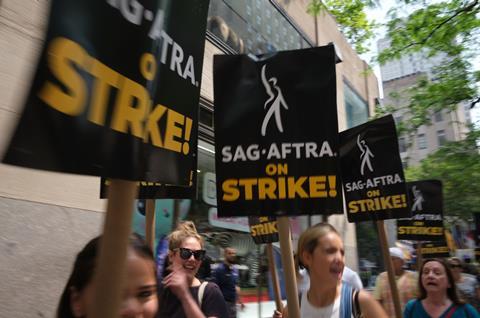Talks between SAG-AFTRA and the studios and streamers were suspended after Wednesday’s session, with Alliance of Motion Picture and Television Producers (AMPTP) asserting that the gap between the two sides is “too great”.
AMPTP, which represents the Hollywood companies in contract negotiations, said in a statement (see below) that it offered the striking actors the same terms on general wage increases and streaming residuals that were ratified by the Directors Guild of America and, earlier this week, the Writers Guild of America. AMPTP said SAG-AFTRA rejected the terms.
In its own statement (also below), SAG-AFTRA accused studio CEOs of “walk[ing] away from the bargaining table after refusing to counter our latest offer”, adding that the AMPTP was using “bully tactics” by “misrepresenting” the cost of the latest SAG-AFTRA proposal.
It is understood the “Gang of Four” Hollywood leaders – Donna Langley (NBCUniversal), Bob Iger (Disney), David Zaslav (Warner Bros Discovery), and Ted Sarandos (Netflix) were in attendance, as they had been since talks resumed this month.
SAG-AFTRA has been on strike for 90 days, since July 14.
Both statements appear in full below.
A Message from the SAG-AFTRA Negotiating Committee
Said the studio CEOs “walked away from the bargaining table after refusing to counter our latest offer”, adding that the AMPTP were using “bully tactics” by “misrepresenting” the cost of the latest SAG-AFTRA proposal.
It is with profound disappointment that we report the industry CEOs have walked away from the bargaining table after refusing to counter our latest offer. We have negotiated in good faith with them, despite the shocking fact that they made an offer last week that was worth less than what they had proposed before the strike started. We have made significant counter-offers, including a complete rewrite of our revenue sharing proposal that would cost the companies under 57C/per subscriber per year. They have rejected our proposals and refused to counter.
Instead they use bully tactics. They deliberately misrepresented the cost of this proposal to the press – by 60%. The companies have used the same strategy with A.I. claiming that it protects performer consent but insisting on “consent” from the first day of employment to use a performer’s digital replica in an entire cinematic world (or franchise project). Our members are not fooled, and neither are the writers. We have suffered too much to give in to their greed and stonewalling. Our resolve is unwavering. Join us at picket lines or solidarity events across the country to make your voice heard. One day stronger. As long as it takes.
Your TV/Theatrical Negotiating Committee.
AMPTP statement
Negotiations between the AMPTP and SAG-AFTRA have been suspended after SAG-AFTRA presented its most recent proposal on October 11. After meaningful conversations, it is clear that the gap between the AMPTP and SAG-AFTRA is too great, and conversations are no longer moving us in a productive direction.
SAG-AFTRA’s current offer included what it characterized as a viewership bonus that, by itself, would cost more than $800 million per year – which would create an untenable economic burden. SAG-AFTRA made few, if not any, moves in the remaining open issues.
Member companies executives and AMPTP reps met with SAG-AFTRA over the last eight working days.
AMPTP extended offers including:
A first-of-its-kind success-based residual for High-Budget SVOD productions.
The highest percentage increase in minimums since 35 years, which would generate an additional $717 million in wages and $1 During that time period, AMPTP extended offers including:
A first-of-its-kind success-based residual for High-Budget SVOD productions.
The highest percentage increase in minimums in 35 years, which would generate an additional $717 million in wages and $177 million in contributions to the Pension and Health Plans during the contract term.
- A 58% increase in salaries for major role (guest star) performers wages on High Budget SVOD Programs.
- A 76% increase in High Budget SVOD foreign residuals for the four largest streaming services.
- Substantial increases in pension and health contribution caps, ranging from 22-33%, which will make it easier for performers to qualify for additional periods of health coverage and earn years of service toward a pension.
- Meeting almost all of the Union’s casting demands, including guardrails for self-tapes and options for virtual and live auditions.
- Compensation adjustments for singers and dancers to sing and dance on camera at the same time, whether in rehearsals or photography. This represents a 30% increase in wages.
- Substantial improvement in relocation allowance. A 200% increase is given if the performer stays on a location overnight for six months. The relocation allowance would now be payable for every season in which the performer is on an overnight location (versus a current limit of two to four seasons).
- Substantial increases in Schedule F money breaks of between 11% and 41%. The 41% increase is applicable to one-hour TV programs, which cover the majority of productions under the Agreement.
- A 25% increase in span money breaks.
- Covering performance capture work under the Agreement, which the Union has sought for 20 years.
- On AI protections:
- Advance consent from the performer and background actor to create and use Digital Replicas;
- No Digital Replica of the performer can be used without the performer’s written consent and description of the intended use in the film;
- Prohibition of later use of that Replica, unless performer specifically consents to that new use and is paid for it; and,
- A “Digital Alteration” that would change the nature of an actor’s performance in a role is not permitted without informing the performer of the intended alteration and securing the performer’s consent.
- On issues such as general wage increases and High-Budget SVOD remuneration, the AMPTP offered terms that were ratified both by the DGA & WGA. SAG-AFTRA refused to accept these terms.




